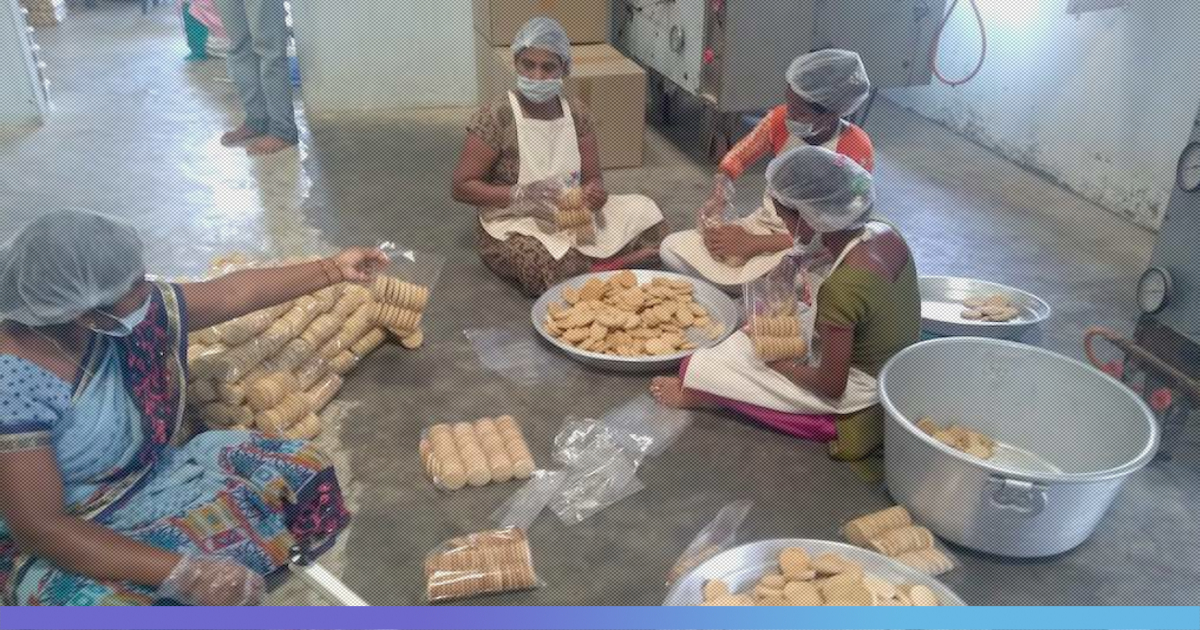be a challenge even when India is food secure.
The much talked about route of fortification of food through centralized factories raises a fundamental question. Rice and wheat in the public distribution system lack adequate nutrition and are later fortified through micro and other nutrients and redistributed at a high cost by the government and more recently in collaboration with other donors and CSR foundations.
Inspiring alternative
Are there other ways where communities are not passive recipients but also contributing to their own nutritional well-being and in the process improving rural livelihoods? A collective enterprise run by the Chinnayya Adivasi Vikas Sangam (CAVS) in Srikakulam district of Andhra Pradesh presents an inspiring alternative wherein local millet based production systems have been reworked to improve nutrition of women and children in the tribal areas.
The Neelamma Talli bakery managed by CAVS today supplies ragi (finger millet) and multigrain biscuits to school children of the Integrated Tribal Development Agency (ITDA) hostels and government schools in Srikakulam as well as at the airports in Tirupati, Vijayawada and Visakhapatnam through the Girijan Cooperative Corporation (GCC) stalls.
Unlike many other coastal Andhra districts, millet production had not declined fully. Truckloads of millets found their way to Nasik and processed to serve the poultry industry even as households continued to consume millets in many tribal areas. CAVS took up the small millets program in 2015-16 and with a gradual increase brought back millets in people’s lives. The then District Collector Dhananjeya Reddy encouraged them to provide biscuits to the tribal children in the hostels whose nutrition levels needed a boost.
Significant scale
The pilot to serve school children that began two years back has now reached significant scale. The bakery that started with a small oven with a single tray five years back and has seen constant up-gradation over the years and the current production capacity of 250 kg per day and a modern oven that can take up 18 trays.
The unit runs on two shifts providing employment for 35 women in and around Seethampeta, who are also members of a Farmer Producer Organization (FPO). The unit serves 47 schools in the area and the biscuits are sent on a monthly basis to the schools and Anganwadi centers as well as the ITDA hostels apart from catering to the increasing demand from urban consumers.
The story of the Adivasi Sangam is one of constant engagement with the tribal communities of the region. Its founder Chinnayya was one of the few graduates in the region who started the Adivasi Vikasa Sangam in 1987 with a view to mobilize tribals to fight for their land rights. Chinnayya formed several Vana Samrakshana Samitis (VSS) in the process.
Millets revival
Following the demise of its founder in 1996, AVS became CAVS. While the government was encouraging tribals to go for mono-crop of cashew and cash crops CAVS was keen to strengthen collective institutions and the Gram Sabha resolved in 2006 to collect the traditional seeds of the region and cultivate millets in 200 acres.
The cultivation of millets continued on a low-key and received a boost with the comprehensive millets revival program taken up by WASSSAN (Watershed Support Services and Activities Network) with the Government of Andhra Pradesh in 2016.

CAVS was one of the active partners and introduced improved cultivation practices such as Guli Ragi and System of Millet Intensification techniques to improve the productivity. With a strong base of collective institutions and a collaborative approach of working with the local Government work increased manifold.
The local administration today purchases close to 80-90% of the biscuits and the women and child department purchases millet-based nutri-mixes for pregnant women. Jaggery from the area is also used for making groundnut balls that is sent to the hostel children. Importantly the process of addressing malnutrition in the region has led to improved rural livelihoods in a remote tribal area through collective entrepreneurship by the women.
Farmers’ collective
Leading the initiative is Padala Bhudevi, the secretary of CAVS, and Kailash, CEO of the Manyadeepika Farmers Producer Company. The three-year old FPO has close to 1,000 members and caters to the diverse production requirements of its members.
Apart from the bakery, the FPO and CAVS have been able to procure and process millets both for sale at local farmers markets (rythu bazaars). The FPO is also a stakeholder of a medium-level millet processing unit, Manyam grains, in Anakapalle in Visakhapatnam district and Bhudevi one of the Directors.
Borra Srinivas, Director of Manyam grains and a rural management professional, was one of the participants of ISEED’s Building and Managing Social Enterprises (BMSE) in February 2019 and had facilitated the visit to the FPOs involved in millets in the region. Manyam procures, processes and markets millets from the FPOs and has been in operation for the last six months.
Women leading the change
The journey of CAVS ably led by Bhoodevi is an inspiring journey of tribal women leading change through collective institutions that began work on a rights-based approach but has effectively used its local presence and strength to leverage these institutions towards collective entrepreneurship.
These local institutions have not just enhanced members’ welfare but have improved the nutrition levels of the school children in 57 villages in the region. This rural India initiative has used ideas of the circular economy by enhancing local production and consumption systems for improved health and well being of the tribals and offering healthy products for the urban consumer too.
The next time you pass through the airports of Andhra Pradesh do look out for the GCC stall and taste the ragi and multigrain biscuits that would soon come out in attractive packets. Munching the millet biscuits can improve our health while improving livelihoods of tribals.
Published with the permission from VillageSquare.in










